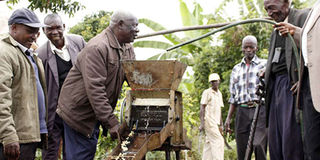Age is no barrier as M’Rinyiru, 97, strives for own coffee miller

Farmers test a pulping machine at Silas M'Rinyiru's farm. in Meru County. The elderly man has a pulping permit, which he acquired in 1996. PHOTO | DAVID MUCHUI | NATION MEDIA GROUP
What you need to know:
- Mr M’Rinyiru travelled to the Coffee Board offices in Nairobi two weeks ago to get a milling licence.
- More than 20 coffee estate owners in Abogeta East are using M’Rinyiru’s marketing licence to sell their beans at the Nairobi Coffee Exchange.
At 97, Mr Silas M’Rinyiru from Yururu village in Meru County believes it is not too late to accomplish his dream of setting up a coffee miller.
Mr M’Rinyiru travelled to the Coffee Board offices in Nairobi two weeks ago to get a milling licence.
The elderly man has a pulping permit, which he acquired in 1996. He also has one of the few coffee marketing licences in the country, which he was given in 2010.
Having a pulping licence allows one to establish a milling factory.
LAND DONATION
The farmer has a 22-acre coffee estate he established as soon as the colonial government allowed black Africans to grow the crop in the late 1950s.
Mr M’Rinyiru says his dream for a coffee estate, complete with a processor, dates back to 1937 when he worked for a British settler.
“When I saw the settler’s farm and how coffee was processed, I vowed to set up a miller. That is why I acquired pulping and marketing licences. I also encouraged my grandson to take a course in brewing,” he said.
Abogeta Coop Society factory, which struggles to process a few thousand kilos of coffee beans, is built on a piece of land Mr M’Rinyiru donated in the 1960s.
“When I came back home from a Mau Mau concentration camp in western Kenya, my neighbours were taking their coffee to a distant factory. I donated the land for a processor,” he said.
“But the decline in coffee prices that began in 1981 made me look for an alternative. I started pulping my produce to improve my earnings.”
DETRACTORS
He faced a lot of resistance from cooperative society officials.
“The dispute went on for years before I acquired the licence in 1996. I named my estate and pulping factory Kirwirwa (a battle ground),” he added.
That made more than 20 other farmers from the area apply for pulping permits.
“I am old and retired but I know the farm needs a processor for future generations. I hope the government speeds up the process of getting the milling licence so that we start looking for funds,” he said.
The more than 20 coffee estate owners in Abogeta East are using Mr M’Rinyiru’s marketing licence to sell their beans at the Nairobi Coffee Exchange.
Mr Fredrick Nkuraru, a local, says he was inspired by Mr M’Rinyiru to set up a pulping line in 1999.





